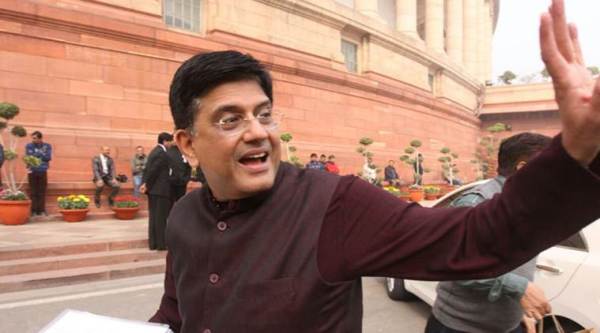 Finance Minister Piyush Goyal, while moving the Bill, said that instances of people escaping, and evading the legal process, is increasing. (Express Photo/Praveen Jain/File)
Finance Minister Piyush Goyal, while moving the Bill, said that instances of people escaping, and evading the legal process, is increasing. (Express Photo/Praveen Jain/File)
The Fugitive Economic Offenders Bill, 2018, meant to prevent big economic offenders such as Vijay Mallya and Nirav Modi from fleeing the country, and evading legal process, was passed by Parliament on Wednesday. Cleared by the Lok Sabha on July 19, it was passed by the Upper House with a voice vote.
Finance Minister Piyush Goyal, while moving the Bill, said that instances of people escaping, and evading the legal process, is increasing, which needs to be checked since current laws do not allow the authorities to deal with the severity of the problem, and the “criminal law does not allow us to impound their property.”
Criticising the government earlier during the debate, Congress member Vivek K Tankha said there was “no shortage of laws in India, but they (offenders) get away because the government does not have the will to stop” willful defaulters. “Is the government’s intention to get a lot of publicity by bringing the law”, he asked, initiating the debate.
Tankha said the country will become a “land of legislation” but these will “serve no purpose”.
Goyal said, “This Bill is an effective, expeditious and constitutional way to stop these offenders from running away. Legislative changes or a new law must be in place to confiscate assets of such absconders till they don’t present themselves in court. We will also work out what has to be done with the confiscated assets.”
He said the government will ensure that unless a person returns, he/she cannot try and stall confiscation of his/her property in the garb of civil cases. He said there are provisions through which special courts can declare a person a fugitive economic offender in an expeditious way. Once a person is declared so, his property will be confiscated, managed and disposed of, Goyal said.
The minister said there cannot be a situation where economic offenders escape abroad and also protect their properties.
He said offences involving funds over Rs 100 crore will be dealt with under this law to focus on large cases.
On the financial limit of Rs 100 crore for invoking the provision of the new law, Goyal said it was being done to catch the big offenders, and not to clog the courts. The Enforcement Directorate will be the investigative agency under the Act, he added.
Congress’s Tankha maintained that only 10 per cent of black money was stashed outside India and wanted to know what the government has done to get back 90 per cent of black money that is within the country. “Why is the government pitching for a threshold of offences worth Rs 100 crore for bringing economic offenders under the purview of the legislation,” he asked. “Even (an) offender of Rs 10 crore is bad.” He said that people like Lalit Modi, Vijay Mallya, Mehul Choksi and Nirav Modi were involved in economic offences worth Rs 2.4 lakh crore.
Quoting the white paper released by the UPA, which stated that black money cannot be dealt with without stringent laws, BJP member Bhupender Yadav said, “Law is too little and too late, as all big fish are outside the country.” He said 30 economic offenders had fled abroad between 2004 and 2014, under the Congress-led UPA, and that assets of banks rose to Rs 52.15 lakh crore from 18.6 lakh crore.
Yadav said money confiscated from such offenders can be used in construction of highways, schools and bridges.
While supporting the Bill, Samajwadi Party’s Neeraj Shekhar raised apprehensions on the implementation of the proposed legislation. He alleged that various economic offenders have left the country with the active support of the government. Pointing out that India has extradition treaties with only 47 countries, he asked how is the government planning to bring the offenders back.
A Navaneethakrishnan (AIADMK) asked the government to add provisions to increase quantum of punishment as well as penalty for economic offenders.
Prasanna Acharya (BJD), while supporting the Bill, said the proposed legislation needs to be legally sustainable.